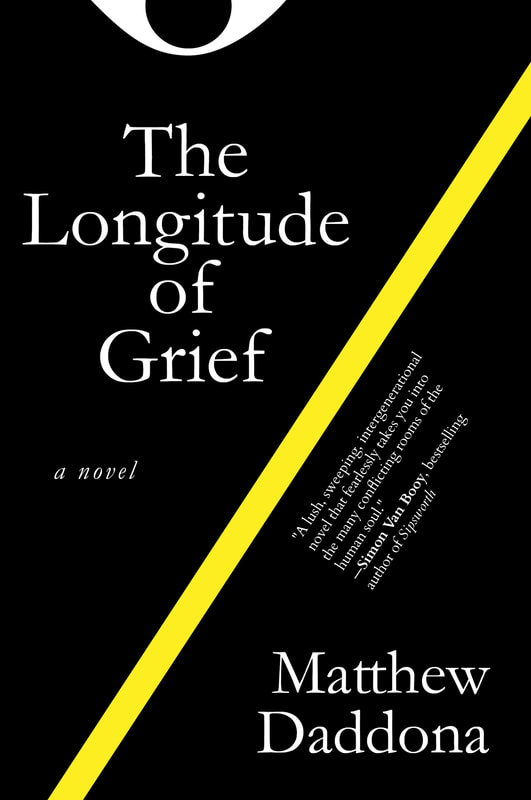The Longitude of Grief

"A mesmerizing read. In The Longitude of Grief, Matthew Daddona traces the complex connections among a boy, his family, and his community. This dark coming-of-age tale explores the ebb and flow of intimacies and betrayals in a small town over the course of the years. A debut rich with melancholy beauty and emotional acumen.” —Helen Phillips, author of The Need
Henry Manero wants to grow up. But growing up is seldom the same as moving on. In this poetic and at times philosophical coming-of-age novel, Henry must learn to navigate his inherited guilt and trauma alongside several generations of dispirited loners—among them his absent father, suffering mother, three wild cousins, and bumbling stepfather. When Henry befriends an elderly man, Josef, whose sagaciousness presents new possibilities in life, he wonders if he can escape the trappings of his small town, and of his own mind. Will Henry achieve a newfound sense of self with the help of Josef, or is Josef yet another false star in a constellation of malevolent men with which Henry is surrounded?
Combining the lyricism of Justin Torres’ We the Animals with the kaleidoscopic visions of boyhood in David Mitchell’s Black Swan Green, Matthew Daddona’s debut novel The Longitude of Grief is a tender rumination on the familial bonds that entangle and entrance us all.
Henry Manero wants to grow up. But growing up is seldom the same as moving on. In this poetic and at times philosophical coming-of-age novel, Henry must learn to navigate his inherited guilt and trauma alongside several generations of dispirited loners—among them his absent father, suffering mother, three wild cousins, and bumbling stepfather. When Henry befriends an elderly man, Josef, whose sagaciousness presents new possibilities in life, he wonders if he can escape the trappings of his small town, and of his own mind. Will Henry achieve a newfound sense of self with the help of Josef, or is Josef yet another false star in a constellation of malevolent men with which Henry is surrounded?
Combining the lyricism of Justin Torres’ We the Animals with the kaleidoscopic visions of boyhood in David Mitchell’s Black Swan Green, Matthew Daddona’s debut novel The Longitude of Grief is a tender rumination on the familial bonds that entangle and entrance us all.
Kirkus Review
A philosophical, intentionally digressive exploration of masculinity, toxic and otherwise.
Daddona’s immersive debut is both a coming-of-age story and a portrait of a community. Becoming an adult can mean many things—some of them logical, others inherently paradoxical. In telling the story of a young man named Henry Manero, Daddona’s novel seeks a balance between the two. It has an immediately striking first sentence: “Henry Manero was born with one of those small hands that was hard to get used to unless you knew him.” From there, the reader learns more about Henry, then a sophomore in high school—his self-destructive approach to smoking, for one, and that he’s being raised by his mother, Alma. The novel’s first half occasionally pivots to fill in details on supporting characters, whether the story of a local anti-war activist or that of the troubled childhood of Henry’s estranged father, Benjamin. Much of the novel focuses on Henry’s attempts to understand what masculinity means to him. The novel abounds with men on the brink of doing awful things, including a moment in which Benjamin fails to be critical enough of his own thoughts: “It was only natural, Benjamin convinced himself, that he had daydreamed of a teenage girl.” Henry narrates the second half of the novel in the first person, and the version of him we meet here is older, both more aware of the injustices his mother and his friend Janine have endured and developing his own creative voice. It’s through his bond with an older man named Josef that Henry comes into his own, but the flawed world around him remains challenging to navigate. There are big ideas aplenty in here—and some bleak moments of moral horror as well.
A philosophical, intentionally digressive exploration of masculinity, toxic and otherwise.
Daddona’s immersive debut is both a coming-of-age story and a portrait of a community. Becoming an adult can mean many things—some of them logical, others inherently paradoxical. In telling the story of a young man named Henry Manero, Daddona’s novel seeks a balance between the two. It has an immediately striking first sentence: “Henry Manero was born with one of those small hands that was hard to get used to unless you knew him.” From there, the reader learns more about Henry, then a sophomore in high school—his self-destructive approach to smoking, for one, and that he’s being raised by his mother, Alma. The novel’s first half occasionally pivots to fill in details on supporting characters, whether the story of a local anti-war activist or that of the troubled childhood of Henry’s estranged father, Benjamin. Much of the novel focuses on Henry’s attempts to understand what masculinity means to him. The novel abounds with men on the brink of doing awful things, including a moment in which Benjamin fails to be critical enough of his own thoughts: “It was only natural, Benjamin convinced himself, that he had daydreamed of a teenage girl.” Henry narrates the second half of the novel in the first person, and the version of him we meet here is older, both more aware of the injustices his mother and his friend Janine have endured and developing his own creative voice. It’s through his bond with an older man named Josef that Henry comes into his own, but the flawed world around him remains challenging to navigate. There are big ideas aplenty in here—and some bleak moments of moral horror as well.
A philosophical, intentionally digressive exploration of masculinity, toxic and otherwise.
More Praise for The Longitude of Grief
A lush, sweeping, intergenerational novel that fearlessly takes you into the many conflicting rooms of the human soul.
--Simon Van Booy, bestselling author of Sipsworth
A multi-generational coming-of-age story beautifully crafted with language and setting that evoke Tom Drury or Barbara Kingsolver's Demon Copperhead. The poetry pulls us in and the finely drawn array of characters keeps us glued to the page until the very end.
--Bethany Ball, author of The Pessimists
In The Longitude of Grief, Matthew Daddona traces the complex connections among a boy, his family, and his community. This dark coming-of-age tale explores the ebb and flow of intimacies and betrayals in a small town over the course of the years. Daddona's debut is rich with melancholy beauty and emotional acumen. A mesmerizing read.
--Helen Phillips, author of The Need
--Simon Van Booy, bestselling author of Sipsworth
A multi-generational coming-of-age story beautifully crafted with language and setting that evoke Tom Drury or Barbara Kingsolver's Demon Copperhead. The poetry pulls us in and the finely drawn array of characters keeps us glued to the page until the very end.
--Bethany Ball, author of The Pessimists
In The Longitude of Grief, Matthew Daddona traces the complex connections among a boy, his family, and his community. This dark coming-of-age tale explores the ebb and flow of intimacies and betrayals in a small town over the course of the years. Daddona's debut is rich with melancholy beauty and emotional acumen. A mesmerizing read.
--Helen Phillips, author of The Need
Order The Longitude of Grief Paperback
Order The Longitude of Grief EBook
About Matthew Daddona

Matthew Daddona is the author of the poetry collection of House of Sound, which Publishers Weekly called “ruminative...a glimpse into a mind on the search for answers.” A multi-hyphenate writer, his work has appeared in dozens of publications, including The New York Times, Newsday, Electric Literature, Whalebone, Tin House, and McSweeney's Internet Tendency. He lives on the North Fork of Long Island, where, in addition to writing, he shucks oysters, installs irrigation systems, and volunteers as a firefighter.
The Longitude of Grief is his first novel.
The Longitude of Grief is his first novel.